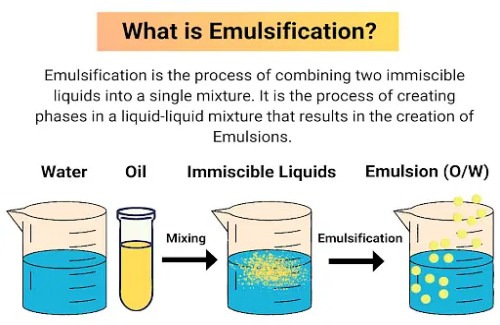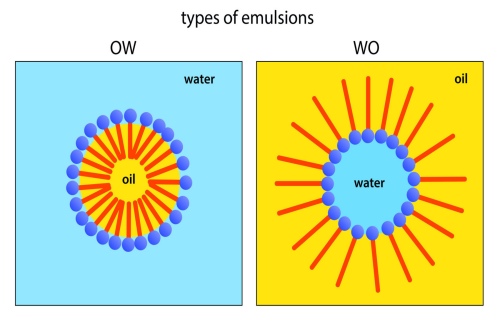The Chemistry Behind Emulsifiers and How They Work
The Chemistry Behind Emulsifiers and How They Work
Blog Article
The Scientific research Behind Emulsifiers and Their Value in Modern Production
Emulsifiers play an essential duty in contemporary production, acting as the unrecognized heroes that mix oil and water for a large variety of items. As consumer choices shift towards cleaner tags, the demand for innovative emulsifiers is growing.
What Are Emulsifiers?
Emulsifiers are necessary representatives worldwide of food and item manufacturing, serving as the glue that binds 2 or else immiscible liquids, like oil and water. You might not realize it, but these compounds play a crucial function in creating steady combinations. They minimize the surface area tension between these fluids, permitting them to blend flawlessly. Typical instances consist of lecithin found in egg yolks and soybeans, and mono- and diglycerides made use of in various processed foods.

When you whip up a salad clothing or delight in a luscious dessert, emulsifiers assist keep that excellent appearance. Without emulsifiers, many foods would certainly separate, leading to unfavorable structures and tastes.
The Chemistry of Emulsification
When you mix oil and water, you may see they do not blend easily; that's where the chemistry of emulsification comes into play. To overcome this obstacle, emulsifiers are used.
These molecules have a hydrophilic (water-attracting) head and a hydrophobic (water-repelling) tail. When you add an emulsifier, its molecules place themselves at the oil-water user interface, decreasing surface tension and enabling the droplets to blend. The emulsifier creates a protective layer around each droplet, preventing them from coalescing back into separate layers. Recognizing this chemistry is essential for accomplishing security in items like dressings, lotions, and sauces, making emulsification vital in modern-day manufacturing.
Sorts Of Emulsifiers
Various types of emulsifiers play essential duties in supporting mixes of oil and water. All-natural emulsifiers, like lecithin from egg yolks or soy, are acquired from plants and pets, making them prominent in food items.
On the other hand, synthetic emulsifiers, such as mono- and diglycerides, are chemically engineered to boost stability and shelf life. They're generally used in processed foods and aesthetic items.
Additionally, you may come throughout non-ionic, anionic, and cationic emulsifiers, each with distinct homes that affect their efficiency. Non-ionic emulsifiers, for instance, work well in a wide variety of pH degrees, while anionic emulsifiers have a tendency to do better in alkaline problems. Comprehending these kinds can assist you choose the right emulsifier for your particular application.
Systems of Emulsion Formation
Comprehending just how emulsions create is necessary for creating secure mixes of oil and water. Emulsions take place when you spread little droplets of one fluid right into one more immiscible fluid, such as oil in water. This procedure needs energy, often provided with frustration or mixing. When you present an emulsifier, it decreases the surface area tension in between the two liquids, enabling them to mix even more easily.
The emulsifier particles have a hydrophilic (water-attracting) head and a hydrophobic (oil-attracting) tail. When you add an emulsifier, these molecules prepare themselves at the oil-water user interface.
Applications of Emulsifiers in Different Industries
Emulsifiers play an essential duty across different industries, making your favored foods smoother and more satisfying. In cosmetics, they boost item appearance and security, ensuring a pleasurable application experience. Plus, in drugs, they assist provide essential ingredients effectively, boosting general effectiveness.
Food Market Makes Use Of
While you might not understand it, emulsifiers play a vital duty in the food sector, boosting the structure, security, and shelf life of several items (Emulsifiers). They're typically discovered in salad dressings, sauces, and mayo, aiding to mix oil and water for a smooth, consistent product. In baked products, emulsifiers improve dough handling and maintain wetness, resulting in a better texture and extended quality. They're also crucial in milk items, where they stabilize emulsions in creams and ice creams, preventing splitting up. Also in treats, emulsifiers help keep crunchiness and learn this here now stop stagnant flavors. By making certain uniformity and quality, emulsifiers are substantial to delivering the scrumptious products you take pleasure in on a daily basis, making them an essential component in modern-day food manufacturing.
Cosmetic Formulas Advantages
When it comes to aesthetic formulations, emulsifiers are essential for creating items that feel lavish and carry out effectively. They assist mix oil and water, ensuring a smooth and stable consistency in creams, lotions, and lotions. You'll discover that emulsifiers improve item security, avoiding splitting up and extending shelf life. This suggests you can appreciate your preferred cream without stressing over it going poor as well promptly. Furthermore, emulsifiers improve the application experience, enabling even circulation and better absorption right into the skin. By utilizing emulsifiers, you also attain an even more enticing appearance, making your cosmetics really feel delightful on your skin. Generally, emulsifiers play a vital duty in supplying top quality cosmetic products that meet your appeal requirements.
Drug Applications Introduction
In the pharmaceutical market, emulsifiers are crucial for formulating reliable drugs. They assist develop secure mixes of oil and water, making certain that energetic components are equally dispersed and easily soaked up by the body. You'll find emulsifiers in different dose types, like lotions, ointments, and fluid suspensions, improving the bioavailability of medicines. They additionally improve the texture and security of items, making them more attractive and much easier to use.
The Effect of Emulsifiers on Product High Quality

By making sure stable solutions, you reduce the threat of perishing and prolong service life, eventually saving you money and time. You'll likewise locate that emulsifiers can improve the bioavailability of energetic ingredients in your items, making them more reliable for customers.
Furthermore, they allow you to develop cutting-edge formulations that meet diverse customer needs. Whether you're crafting a luscious clothing or an extravagant cream, emulsifiers are crucial for accomplishing the preferred outcomes. In other words, by understanding and leveraging the influence of emulsifiers, you can greatly elevate the high quality of your products.
Future Patterns in Emulsifier Growth
As the need for cleaner labels and sustainable items climbs, the development of brand-new emulsifiers is readied to evolve look at more info considerably. You'll observe a shift towards plant-based and natural emulsifiers, driven by consumer choices for components that are eco-friendly and less refined. Advancements in biotechnology will likely improve the functionality and efficiency of these emulsifiers, allowing suppliers to create steady formulas with less ingredients.
You might additionally see an increase in multifunctional emulsifiers that not just support solutions however likewise boost flavor, texture, or dietary worth. This fad can simplify ingredient lists while improving item performance.
Additionally, with developments in nanotechnology, emulsifiers could be crafted at the molecular degree to accomplish extraordinary stability and effectiveness. Emulsifiers. As you explore these patterns, you'll discover that the future of emulsifier growth is not nearly capability, however additionally concerning accepting sustainability and openness in components
Regularly Asked Questions
Are Emulsifiers Safe for Intake in Food Products?
Yes, emulsifiers are generally risk-free for intake in food. They've been extensively researched and approved by food safety and security authorities, so you can enjoy your favored foods without fretting about their influence on your health.
Can Emulsifiers Be Derived From All-natural Resources?
Yes, you can obtain emulsifiers from natural sources. Components like lecithin from egg yolks or soybeans and casein from milk prevail. These all-natural emulsifiers assist maintain mixes without artificial additives, making them preferred in numerous items.

Exactly How Do Emulsifiers Influence Life Span of Products?
Emulsifiers maintain mixes, preventing splitting up and putridity - Emulsifiers. By maintaining harmony, they prolong items' shelf life, making certain quality and quality. You'll discover that emulsifiers assist keep your favorite foods and cosmetics executing more than time
What Are Possible Negative Effects of Emulsifiers?
You may experience digestion concerns when consuming items with emulsifiers, as they can interfere with my site gut bacteria. Some research studies recommend potential web links to swelling or allergic reactions, yet a lot more research is needed to totally comprehend these effects.

Are There Alternatives to Standard Emulsifiers?
Yes, there are alternatives to standard emulsifiers. You can check out alternatives like all-natural periodontals, starches, or lecithin. Each alternate offers one-of-a-kind homes, so experiment to locate what works best for your certain application.
Report this page